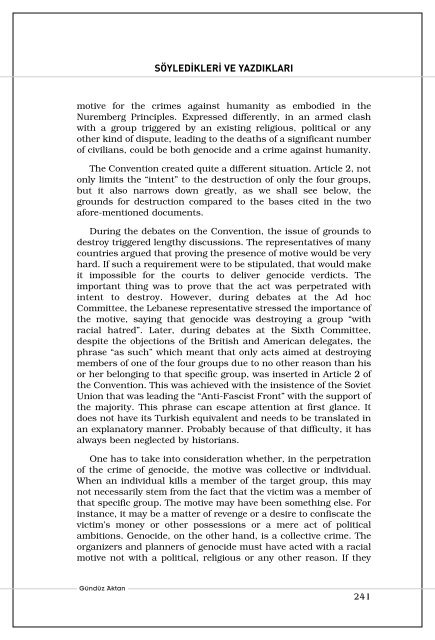gunduz-aktan-kitap-soyledikleri-ve-yazdiklari
gunduz-aktan-kitap-soyledikleri-ve-yazdiklari
gunduz-aktan-kitap-soyledikleri-ve-yazdiklari
You also want an ePaper? Increase the reach of your titles
YUMPU automatically turns print PDFs into web optimized ePapers that Google loves.
SÖYLEDİKLERİ VE YAZDIKLARI<br />
moti<strong>ve</strong> for the crimes against humanity as embodied in the<br />
Nuremberg Principles. Expressed differently, in an armed clash<br />
with a group triggered by an existing religious, political or any<br />
other kind of dispute, leading to the deaths of a significant number<br />
of civilians, could be both genocide and a crime against humanity.<br />
The Con<strong>ve</strong>ntion created quite a different situation. Article 2, not<br />
only limits the “intent” to the destruction of only the four groups,<br />
but it also narrows down greatly, as we shall see below, the<br />
grounds for destruction compared to the bases cited in the two<br />
afore-mentioned documents.<br />
During the debates on the Con<strong>ve</strong>ntion, the issue of grounds to<br />
destroy triggered lengthy discussions. The representati<strong>ve</strong>s of many<br />
countries argued that proving the presence of moti<strong>ve</strong> would be <strong>ve</strong>ry<br />
hard. If such a requirement were to be stipulated, that would make<br />
it impossible for the courts to deli<strong>ve</strong>r genocide <strong>ve</strong>rdicts. The<br />
important thing was to pro<strong>ve</strong> that the act was perpetrated with<br />
intent to destroy. Howe<strong>ve</strong>r, during debates at the Ad hoc<br />
Committee, the Lebanese representati<strong>ve</strong> stressed the importance of<br />
the moti<strong>ve</strong>, saying that genocide was destroying a group “with<br />
racial hatred”. Later, during debates at the Sixth Committee,<br />
despite the objections of the British and American delegates, the<br />
phrase “as such” which meant that only acts aimed at destroying<br />
members of one of the four groups due to no other reason than his<br />
or her belonging to that specific group, was inserted in Article 2 of<br />
the Con<strong>ve</strong>ntion. This was achie<strong>ve</strong>d with the insistence of the Soviet<br />
Union that was leading the “Anti-Fascist Front” with the support of<br />
the majority. This phrase can escape attention at first glance. It<br />
does not ha<strong>ve</strong> its Turkish equivalent and needs to be translated in<br />
an explanatory manner. Probably because of that difficulty, it has<br />
always been neglected by historians.<br />
One has to take into consideration whether, in the perpetration<br />
of the crime of genocide, the moti<strong>ve</strong> was collecti<strong>ve</strong> or individual.<br />
When an individual kills a member of the target group, this may<br />
not necessarily stem from the fact that the victim was a member of<br />
that specific group. The moti<strong>ve</strong> may ha<strong>ve</strong> been something else. For<br />
instance, it may be a matter of re<strong>ve</strong>nge or a desire to confiscate the<br />
victim’s money or other possessions or a mere act of political<br />
ambitions. Genocide, on the other hand, is a collecti<strong>ve</strong> crime. The<br />
organizers and planners of genocide must ha<strong>ve</strong> acted with a racial<br />
moti<strong>ve</strong> not with a political, religious or any other reason. If they<br />
Gündüz Aktan<br />
241



